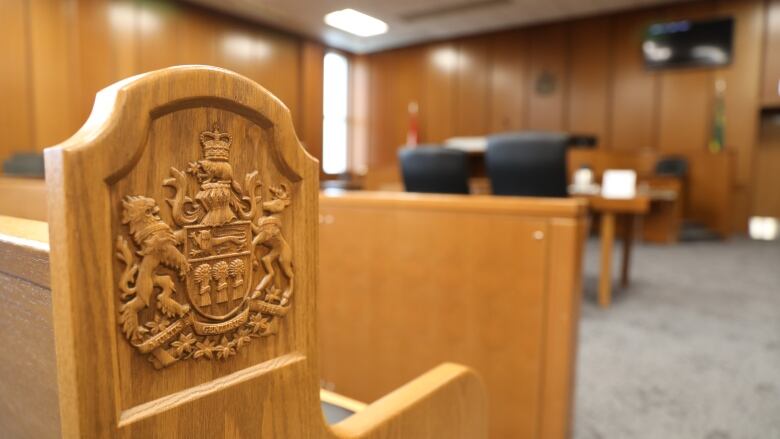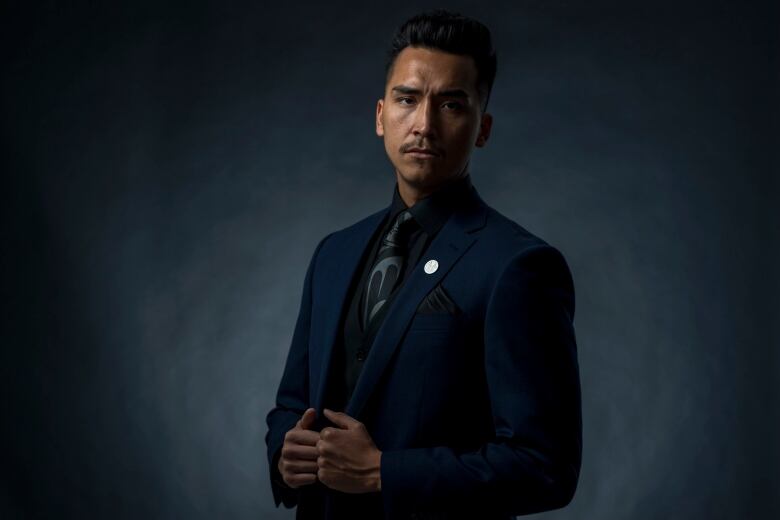Maintaining the Canadian legal system is obstructing justice for Indigenous peoples
Even Indigenous legal professionals are complacent with the status quo

This Opinion piece is by Andr Bear, a graduate of the University of Saskatchewan's law school who is now pursuing his masterof laws.
For more information aboutCBC's Opinion section, please see theFAQ.
The Canadian legal system seems eager to fill its prisonsmostly with Indigenous peoples, as evidenced by our staggering overrepresentation.
On the other end, there are countless legal professionals making a good living off our overrepresentation: lawyers, judges, prison officials and anyone else who profits.
Although Indigenous peoples desperately need allies in the legal profession, at some point we should also recognize how the ongoing injustice seems to be paying off mortgages for many non-Indigenous professionals.
At what point do we recognize that the more injustice we face, the more profitable we are to those that are benefiting from the legal system?
Complicit with the system
We are now at a point where even Indigenous legal professionals like myself have become complicit with the Canadian system, because it's easy for us to doubt our ability to make a difference through the competitive and colonial nature of law.
Indigenous legal professionals fight through the endless barriers of systemic and institutionalized racism pitted against us, to fiercely advocate for our people's rights to be treated with dignity and compassion.
While becoming a lawyer myself, I am proud to see revered Indigenous representation in the legal profession, but I cannot meaningfully participate in this system when I know better alternatives exist for our people.

Establishing tribal courts
The United States, for example, has operated a tribal court system since the 1980s, under which tribal nations are in charge of making their own laws and enforcing them on their own land.
These tribal courts are not perfect by any means, but it's inspiring to see Indigenous nations in charge of their own legal system, especially when considering the possibilities of establishing a foundation of healing and restorative justice.
Tribal courts have existed for decades, and the practice of restorative justice has already been proven to be more effective than retraumatizing people through a violent prison system.
You would hope that, in a place like Canada, we might be world leaders when it comes to fairness and equality. That is mostly true unless you are an Indigenous person.
The mistreatment of Indigenous peoples in Canada's legal system is abhorrent. We have endless reports proving this that the government will recognize but fail to act upon.
Unfortunately, even most Indigenous lawyers that I know are comfortable practising within the Canadian legal system, but this doesn't mean that they agree with its colonial nature. I am certain that if they could work in an alternative restorative justice system, many of them would.
Recognizing Indigenous laws
We are at a critical point in time. Canadian courts are finally starting to recognize Indigenous laws, and Indigenous peoples are remembering the spiritual laws we were once forced to forget.
It can be overwhelming even for Indigenous legal professionals to understand the weight that our spiritual laws and responsibilitiescarry unless we are trained by medicine people and connected to our ancestral way of thinking.
It took me around 12 years of consistent fasting and yearly sun dancing to capture even a sliver of what our ancestors understood about our spiritual laws.
Nonetheless, that sacred part of my life always seemed completely separate from my understanding of what makes a legitimate legal system.
But maybe not for long.
Legal systems coming together
Perhaps times are changing. Both the Canadian government and the Supreme Court are beginning torecognize Indigenous laws, and our authority to enforce them on our own land.
For nowwe are dependent on the colonial legal system, so dependent that sometimes it is hard to see a future where Indigenous nations are back in control.
When I see the thousands of Indigenous peoples crowding our prisons, and the Indigenous children statistically likely to join them, I cannot fathom why there hasn't already been a co-ordinated effort to establish an Indigenous-controlled court system in Canada.
I'm not saying legal professionals agree with the way things are, I'm saying we are complacent enough to accept it. This could be condemning another generation of Indigenous children to the Canadian prison system.
Interested in writing for us? We accept pitches for Opinion and First Person pieces from Saskatchewan residents who want to share their thoughts on the news of the day, issues affecting their community or who have a compelling personal story to share. No need to be a professional writer!
Read more about what we're looking for here, then emailsask-opinion-grp@cbc.cawith your idea.












_(720p).jpg)


 OFFICIAL HD MUSIC VIDEO.jpg)
.jpg)



























































































